
Carrousel is a booklet published in 1987 containing three short texts written by Vladimir Nabokov in 1923 for "Karussel", a Russian cabaret.

Carrousel is a booklet published in 1987 containing three short texts written by Vladimir Nabokov in 1923 for "Karussel", a Russian cabaret.
The three texts are:
"Cantaboff" of course refers to "Cantab." and the author's recent graduation from Trinity College, Cambridge; "Sirine" was Nabokov's occasional French spelling for "Sirin", his early Russian pseudonym.
Brian Boyd regards the poem as "banal", the prose as "masterly". [1]

The only known previous appearance of these three texts had been within the second issue of a trilingual (German, French, English) brochure, Karussel – Carousal – Carrousel, published in Berlin in 1923 as the prospectus for "Karussel", a Russian theatre travelling to Berlin. [2] [3]
Stella de Does-Kohnhorst discovered a copy of this rare prospectus, gave it to the Nabokov family, and asked for and obtained their permission to publish the contributions by Nabokov. [2] [3]
There have been two editions, both designed by Bram de Does and published in 1987 by Spectatorpers in Aartswoud (the Netherlands). Both claim to be "limited" (to 100 copies of the first, and 150 of the second), but copies of both with "HC" in place of the number are known, suggesting larger numbers. The publisher's note to the first edition explains the reason for the two editions: a detailed "Introductory Note" by Dmitri Nabokov, the author's son, had arrived too late for inclusion in the first. Thus the first edition lacks this note; the second, which is in a larger format, includes it. The first edition – of which Michael Juliar has stated (without explanation) that "Thirty or so copies survive" – is a paperback that was not offered for sale; the revised edition was made available in hardbound and paperback versions. [2] [3]
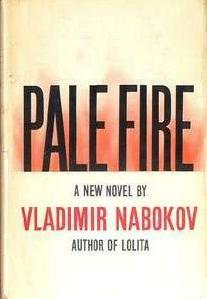
Pale Fire is a 1962 novel by Vladimir Nabokov. The novel is presented as a 999-line poem titled "Pale Fire", written by the fictional poet John Shade, with a foreword, lengthy commentary and index written by Shade's neighbor and academic colleague, Charles Kinbote. Together these elements form a narrative in which both fictional authors are central characters. Nabokov wrote Pale Fire in 1960–61, after the success of Lolita had made him financially independent, allowing him to retire from teaching and return to Europe. It was commenced in Nice and completed in Montreux, Switzerland.
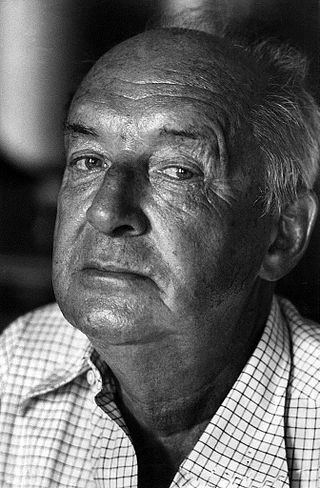
Vladimir Vladimirovich Nabokov, also known by the pen name Vladimir Sirin, was an expatriate Russian and Russian-American novelist, poet, translator, and entomologist. Born in Imperial Russia in 1899, Nabokov wrote his first nine novels in Russian (1926–1938) while living in Berlin, where he met his wife. He achieved international acclaim and prominence after moving to the United States, where he began writing in English. Nabokov became an American citizen in 1945 and lived mostly on the East Coast before returning to Europe in 1961, where he settled in Montreux, Switzerland.
Matthew Joseph Bruccoli was an American professor of English at the University of South Carolina. He was the preeminent expert on F. Scott Fitzgerald. He also wrote about other writers, notably Ernest Hemingway, Thomas Wolfe and John O'Hara, and was editor of the Dictionary of Literary Biography.

Vladimir Ivanovich Dal was a noted Russian-language lexicographer, polyglot, Turkologist, and founding member of the Russian Geographical Society. During his lifetime he compiled and documented the oral history of the region that was later published in Russian and became part of modern folklore.
Charles Kinbote is the unreliable narrator in Vladimir Nabokov's novel Pale Fire.
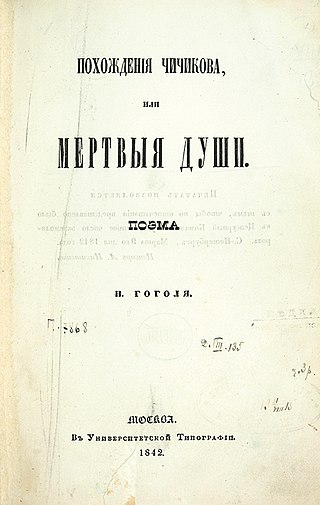
Dead Souls is a novel by Nikolai Gogol, first published in 1842, and widely regarded as an exemplar of 19th-century Russian literature. The novel chronicles the travels and adventures of Pavel Ivanovich Chichikov and the people whom he encounters. These people typify the Russian middle aristocracy of the time. Gogol himself saw his work as an "epic poem in prose", and within the book characterised it as a "novel in verse". Gogol intended the novel to be the first part of a three-volume work, but burned the manuscript of the second part shortly before his death. Although the novel ends in mid-sentence, it is regarded by some as complete in the extant form.

Boris Nikolaevich Bugaev, better known by the pen name Andrei Bely or Biely, was a Russian novelist, Symbolist poet, theorist and literary critic. He was a committed anthroposophist and follower of Rudolf Steiner. His novel Petersburg (1913/1922) was regarded by Vladimir Nabokov as the third-greatest masterpiece of modernist literature. The Andrei Bely Prize, one of the most important prizes in Russian literature, was named after him. His poems were set to music and performed by Russian singer-songwriters.
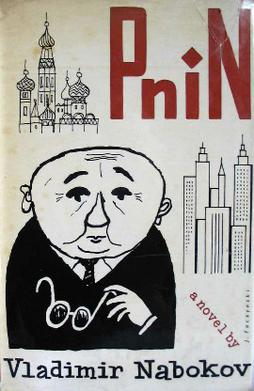
Pnin is Vladimir Nabokov's 13th novel and his fourth written in English; it was published in 1957. The success of Pnin in the United States launched Nabokov's career into literary prominence. Its eponymous protagonist, Timofey Pavlovich Pnin, is a Russian-born assistant professor in his 50s living in the United States, whose character is believed to be based partially on the life of both Nabokov's colleague Marc Szeftel as well as on Nabokov himself. Exiled by the Russian Revolution and what he calls the "Hitler war", Pnin teaches Russian at the fictional Waindell College, loosely inspired by Cornell University and Wellesley College—places where Nabokov himself taught.

The Stories of Vladimir Nabokov is a posthumous collection of every known short story that Vladimir Nabokov ever wrote, with the exception of "The Enchanter". In the current printing of this work, sixteen stories not previously published in English are translated by the author's son, Dmitri Nabokov. The collection was first published in America by Alfred A. Knopf in 1995.

Nabokov's Congeries was a collection of work by Vladimir Nabokov published in 1968 and reprinted in 1971 as The Portable Nabokov. Because Nabokov supervised its production less than a decade before he died, it is useful in attempting to identify which works Nabokov considered to be his best, especially among his short stories.

The Gift is Vladimir Nabokov's final Russian novel, and is considered to be his farewell to the world he was leaving behind. Nabokov wrote it between 1935 and 1937 while living in Berlin, and it was published in serial form under his pen name, Vladimir Sirin.
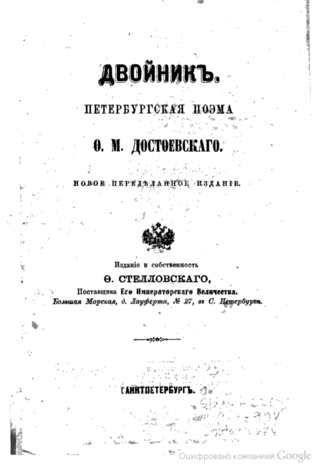
The Double: A Petersburg Poem is a novel written by Fyodor Dostoevsky. It was first published on 30 January 1846 in the Otechestvennye zapiski. It was subsequently revised and republished by Dostoevsky in 1866.

Brian David Boyd is a professor of literature known primarily as an expert on the life and works of author Vladimir Nabokov and on literature and evolution. He is a University Distinguished Professor in the Department of English at the University of Auckland, New Zealand.

Despair is the seventh novel by Vladimir Nabokov, originally published in Russian, serially in the politicized literary journal Sovremennye zapiski during 1934. It was then published as a book in 1936, and translated to English by the author in 1937. Most copies of the 1937 English edition were destroyed by German bombs during World War II; only a few copies remain. Nabokov published a second English translation in 1965; this is now the only English translation in print.
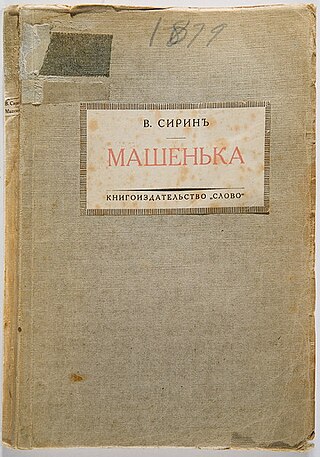
Mary is the debut novel by Vladimir Nabokov, first published under the pen name V. Sirin in 1926 by Russian-language publisher "Slovo".
"Mademoiselle O" is a memoir by Vladimir Nabokov about his eccentric Swiss-French governess.

A Russian Beauty and Other Stories is a collection of thirteen short stories by Russian author Vladimir Nabokov. The short stories in this collection were originally written in Russian between 1927 and 1940 under the pseudonym Vladimir Sirin. Before being collated into short story collections, some were published by various European Russian émigré newspapers and magazines.
This is a list of works by writer Vladimir Nabokov.

Lolita is a 1955 novel written by Russian-American novelist Vladimir Nabokov that addresses the controversial subject of hebephilia. The protagonist is a French literature professor who moves to New England and writes under the pseudonym Humbert Humbert. He describes his obsession with a 12-year-old "nymphet", Dolores Haze, whom he kidnaps and sexually abuses after becoming her stepfather. Privately, he calls her "Lolita", the Spanish nickname for Dolores. The novel was originally written in English, but fear of censorship in the U.S. and Britain led to it being first published in Paris, France, in 1955 by Olympia Press.
Fredson Thayer Bowers (1905–1991) was an American bibliographer and scholar of textual editing.